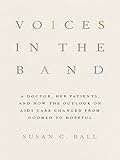I read the article about HIV in Cuba (www.nytimes.com/2012/05/08/health/a-regimes-tight-grip-lessons-from-cuba-in-aids-control.html) with great interest. In the 1980s patients who had HIV in Cuba were put into quarantine. Prison, only nicer.
 I remember those early days of HIV. In the U.S. there was tremendous stigma associated with having AIDS. At first the disease was a giant riddle, no one knew what caused it or where it came from. And that sense of unknowing made people very afraid. Could you get HIV from touching someone who had it? From breathing their air? From a hug or a toilet seat or a handshake or sitting on the same bus?
I remember those early days of HIV. In the U.S. there was tremendous stigma associated with having AIDS. At first the disease was a giant riddle, no one knew what caused it or where it came from. And that sense of unknowing made people very afraid. Could you get HIV from touching someone who had it? From breathing their air? From a hug or a toilet seat or a handshake or sitting on the same bus?
Even after the virus was identified and it was clear that there needed to be significant blood-to-blood or body fluid-to-blood contact in order for infection to take place, the fear and stigma surrounding patients with HIV remained. And many patients still face it in their families or communities today.
In Cuba the quarantine situation petered out after several years. Yet its work to protect its people from HIV has remained strong. Cuba’s health care system provides free condoms to everyone, free and frequent HIV testing and thorough sex education to kids and young adults. The sex workers in Cuba are very strongly encouraged and supported to use condoms in their work. There is not very much HIV in Cuba these days (fewer than 15,000 cases) and relatively few new infections each year.
In the U.S. we have more than 50,000 new infections every year. Condoms are not free (they are free in our clinic and in lots of health care facilities and HIV support programs) and sex education is not adequate. We never put people in quarantine but the stigma and prejudice that exist in many parts of the country act as a virtual quarantine for some patients.
I wish our politicians had had the foresight and courage to recognize the danger and the cost of HIV in this country back in the 1980s. We didn’t need quarantine but we needed and continue to need much more education. Not to mention availability of testing and treatment centers, free condoms (and the message to use them) and understanding that HIV can and should be prevented. When not prevented, HIV can and should be treated.



Thank you for this thoughtful insight and your continued advocacy for inclusion and reality. Your work is and has been a voice for the vulnerable in our country and world.